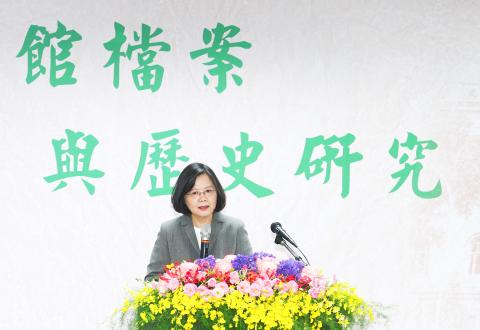President Tsai Ing-wen (蔡英文) yesterday said that her administration would continue work to declassify old government records as part of its transitional justice efforts.
Tsai made the remarks at the opening of a symposium hosted by the Academia Historica in Taipei.
Declassifying old government records is not just for transitional justice, but it also befits the government’s “open government” ideals and allows public access to government information, Tsai said.

Photo: CNA
While the Academia Historica is tasked with managing presidential and vice presidential records and artifacts, Tsai said that the Academia Historica belongs to the public, and that academics and members of the public are welcome to make use of archived documents so that with critical analysis of historical truth, there can be a more diverse explanation of the nation’s history.
Tsai applauded the Academia Historica under the leadership of president Wu Mi-cha (吳密察) for having swiftly compiled 260,000 documents for online publication.
“Without the limitation of time and space, members of the public and researchers can freely browse the archive, which is of great help to the development of research on history,” Tsai said of the institute’s publication in April of formerly confidential government archives dating to Chiang Kai-shek’s (蔣介石) regime.
The files, accessible on the institution’s archive at http://ahonline.drnh.gov.tw, were uploaded in several batches between January and April after being individually reviewed between August and December last year.
The collection includes documents related to the Northern Expedition — a Chinese Nationalist Party (KMT) campaign led by Chiang against local warlords in China from 1926 to 1928; the Second Sino-Japanese War; Taiwan-China unification plans and government suppression of civil strife, the institute said.
The collection includes manuscripts, electronic documents, letters, books, maps, photographs and other articles, the institute said, adding that they represent 98.8 percent of all existing documents related to Chiang.
The remainder includes items that cannot be posted due to copyright restrictions (0.74 percent) and some that are restricted due to privacy concerns (0.44 percent), while 0.02 percent are permanently confidential to protect intelligence sources, it said.

Palauan President Surangel Whipps Jr arrived in Taiwan last night to kick off his first visit to the country since beginning his second term earlier this year. After arriving at Taoyuan International Airport at around 6:30 pm, Whipps and his delegation were welcomed by Minister of Foreign Affairs Lin Chia-lung (林佳龍). Speaking to gathered media, the Palauan leader said he was excited and honored to be back in Taiwan on his first state visit to Taiwan since he was sworn in this January. Among those traveling with Whipps is Minister of State Gustav N. Aitaro, Public Infrastructure

President William Lai (賴清德) yesterday thanked Palau for its continued support of Taiwan's international participation, as Taipei was once again excluded from the World Health Assembly (WHA) currently taking place in Switzerland. "Palau has never stopped voicing support for Taiwan" in the UN General Assembly, the WHO and other UN-affiliated agencies, Lai said during a bilateral meeting with visiting Palau President Surangel Whipps Jr. "We have been profoundly touched by these endorsements," Lai said, praising the Pacific island nation's firm support as "courageous." Lai's remarks came as Taiwan was excluded for the ninth consecutive year from the WHA, which is being held in

RESOLUTIONS DEBATE: Taiwan’s allies said that UN and WHA resolutions cited by China and other nations ‘do not determine Taiwan’s participation in WHO activities’ A proposal to invite Taiwan to this year’s World Health Assembly (WHA) was rejected on Monday, resulting in Taipei’s absence from the annual meeting for a ninth consecutive year, although partners spoke up for Taiwan’s participation at the first day of the meeting. The first agenda item after the opening was a “two-on-two debate” on a proposal to invite Taiwan to participate at the WHA as an observer. Similar to previous years, two countries made statements in favor of the proposal, while two others expressed their opposition. Philippine Secretary of Health Teodoro Herbosa, president of the 78th WHA, accepted the WHA General Committee’s

At least three people died and more than a dozen were injured yesterday afternoon when a vehicle struck a group of pedestrians in New Taipei City’s Sansia District (三峽). The incident happened at about 4pm when a car rammed into pedestrians at an intersection near Bei Da Elementary School. Witnesses said the sedan, being driven at a high speed, ran a red light, knocking scooters out of the way and hitting students crossing the road before careening into a median near the intersection of Guocheng and Guoguang streets. The incident resulted in three deaths and 13 injuries, including the driver, a 78-year-old man